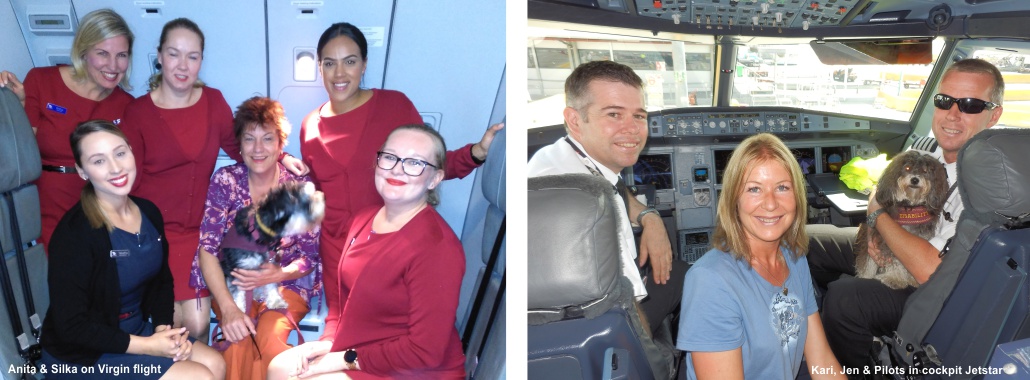
Home Therapy Assistance Dog Certification
This is a program designed to assist those who live in Retirement Villages, Strata Title Complexes or Rental Accommodation and who have a disability with the need for an Assistance Dog
- yet only within their home environment.
Often overlooked by our industry, this area of often single and lonely people with a genuine emotional disability
- too frightened to live alone - and need to have their dog with them, but are not allowed by the rules of the accommodation area they live in.
Many disabled persons who still live at home may require their dog to alert if they are in an emotional state and need the comfort of their dog to continue their daily quality of life. It needs to be known, these dogs are licensed for home use only, and have no rights beyond a pet outside their home grounds.
For application and renewals, the dogs need be assessed by their Veterinarian, and the handler will need to have our Medical Report completed regarding their disability by their Medical Practitioner.
Nearly always, no further training is needed, as the team does not access public areas other than the home.
Disability Assistance Dog - also known as Medical Assistance Dog
These are the dogs who are out and about with their handlers on a daily basis assisting the handler with their disability
- whether to alert or assist. There is also the alternate handler(s), who has the licence to handle the dog should you be unable to do so.
We have dogs in our teams who assist with various medical conditions, however we do not assist with Vision or Hearing impaired clients requiring dogs for assistance. Please speak with any of our team members so we may point you in the right direction. Our clients are allowed to take their dogs to all areas available to the public, with some restrictions due to possible contamination.
There is extensive training requirement here and it should be made very clear that the main prerequisite is commitment. You and your dog are a valuable team, and with the commitment, you have no specific time frame to complete your work, it is all at your pace. However, we do say about 6 to 12 months to come up to the expectations of passing your Public Access Test (P.A.T.) and having your dog assist with your every-day needs.
We retain no ownership over your dog as they are yours, and we do not pre-train dogs and sell them. Each person is unique with their disability, and our team of International Standards Senior Behaviourist, Trainer and Assessor volunteers can assist if you don't have a dog and not sure of a breed for your purposes.
Visitation Therapy Assistance Dogs
Have you the yearning to bring comfort to the elderly, sick or infirm people in hospitals, institutions and other places alike? Have you the empathy and patience to spend time with your dog and these people who, because of their own circumstances, may not have access to a friendly, furry face?
We have a specifically designed course to help you attain the heights to give back to the community by taking your dog into these places for the purpose of giving unconditional love from your dog.
The course is similar to the Medical Assistance Dog, but with a few variations regarding your rights as a Visitation team. There is homework conducted for this course, but when you see pure delight in people's eyes at the presence of your highly trained dog - it will make it all worthwhile.
DAD - Courses
The initial course we use is Basic Canine Understanding - to familiarise the prospective handler how to associate with their dog in any public access area.
A typical Home Therapy Assistance Dog would be exempt in most cases from these courses, as they have no Public Access except what a normal pet would experience in Accomodation.
So what is this course and how do I pass it?
We have a couple of courses of Modules to be
completed by the handler and any alternate handler. They
are designed to give you understanding of your dog; it's environment; it's expectations from you and how they educate you to their behaviours of working.
We do not train the dogs. We assist the client to train their own dog, and because of this, the only qualification we need in any applicant is real commitment ... and of course, a love of their dog. They are so dependent on our love!
We work with you to attain the "rights of passage" into the public arena by passing the Public Access Test (P.A.T.) with flying colours, and maintaining these standards for as long as you need us.
If you find our courses intimidating, or you simply cannot do it, don't worry, we are here to help, not to put you through huge amounts of stress. Never forget, when working with us, that we too have "been there", we do understand.
We train you to train your dog under supervision of our highly trained company team of volunteers.
Apply here
![]() Be sure to include your home address, phone number, and a reasonably full/clear overview of your disability and if you have a dog, the breed and age/sex.
Be sure to include your home address, phone number, and a reasonably full/clear overview of your disability and if you have a dog, the breed and age/sex.
The only qualification we need in any applicant is real commitment ... and of course, a love of their dog. They are so dependent on our love!
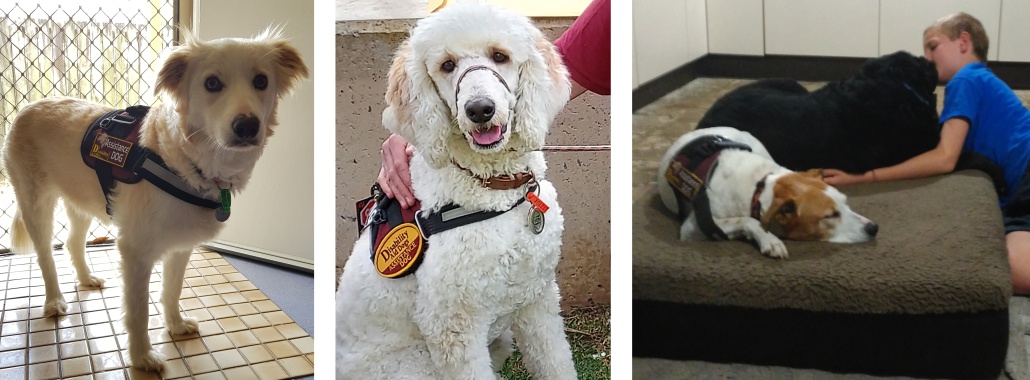
DAD - FAQ
HOW IS DAD RECOGNISED?
Founded on 16th February 1994, we are well over 20 years old. In the early to mid 90's there was little or no understanding of the then Disability Discrimination Act 1994, which made it almost impossible to take any trained dog anywhere unless a permit from the Guide Dogs was held.
As this was in most cases near impossible, our founder Alex Van Oeveren made many complaints to the then Human Rights and Equal Opportunity Commission (HREOC) now known as The Australian Human Rights Commission. Finally, after massive research and complaints to the Commission, Alex became a Disability Discrimination Legal Advocate. In 2003, the complaints against numerous government agencies and commissions via the Disability Discrimination Act 1992, a huge milestone was reached, as an Organisation we were recognised by the Commission in 2003/2004.
Now, over 20 years later, the Federal Disability Discrimination Act 1992 was revised via royal ascent in 2009. We are also recognised by:
- All State and Territory Public Transport Agencies, particularly NSW Railcorp (with the exception of the Western Australian Transport Authority as they require local government permits for an assistance dog to operate in that state).
HOW ARE WE FUNDED?
We are funded by the fees we charge, we do not rely on charity fund raisers, that is why we are still here after over 20 years. We do not rely on any hand outs, nor are we funded in any way by the government, so we are totally independent!
Our courses are also independent but are recognised in Australia and in parts of Europe and the UK. This is because we have the industry experience and have been around for so long. We are the oldest and also one of the largest organisations of our type in Australia ... we will be here for the long haul.
HOW DO I APPLY?
The application procedure is quite simple, you simply in the first instance send us an email that sets out your initial reasons for applying to us. Please Note: A well set out and explanatory email with ALL your contact details, your address is all important.
IS MY PERSONAL INFORMATION SAFE?
Under the Federal Privacy Act 1988 your information is only ever used within our Executive Management and Company Trainers that are under the same laws and our own privacy statement. Brief and incomplete email applications may not be answered - it is your independence - we need your full commitment to ensure we know who is applying.
HOW LONG TILL APPROVED?
All applications will be assessed in the next Board Meeting (3 Directors), normally held monthly, so your application will be processed within a month under normal circumstances.
WHAT HAPPENS NEXT?
Once your email has been received, we will email you our Welcome and Information Pack which outlines all procedures of having a Disability Aid Dog or Home Therapy Assistance Dog. Once you have read and initialled each page in understanding of our procedures and is returned to our Head Office, an Application form will be sent to you with an Application fee of $75.00, non-refundable. When full application and fee received, as above, the next Board Meeting will decide your application.
WHAT THEN?
A formal course will be sent to you (Basic Canine Understanding) for you to become proficient in our training programs. This is nearly always done via emails and phone calls if not close to one of our trainers:
Kingaroy - Nanango QLD (approx 3 hours NW of Brisbane Airport)
East Gosford NSW
Rockingham Western Australia (approx 1 hour South of Perth)
HOW TO RECOGNISE A DAD WORKING DOG
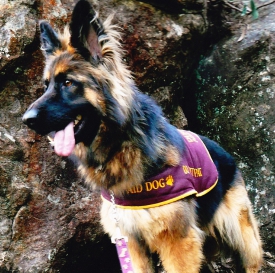
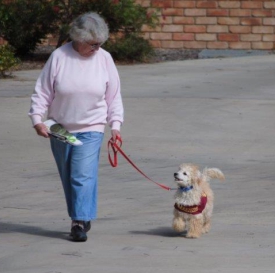
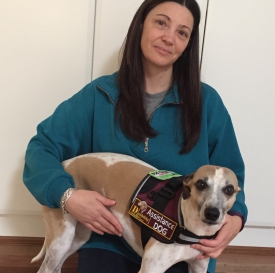
DO YOU TRAIN DOGS?
No. This is done by the Guide Dog Organisations and Vision Australia.
ARE DISABILITY AID DOGS RECOGNISED LIKE GUIDE DOGS?
In most cases, yes.
HOW LONG DOES IT TAKE TO TRAIN A DISABILITY AID DOG?
See Programs and this will give you some idea. The average is about 6 to 12 months.
DO YOU ONLY USE LABRADORS?
This is a common question, the answer is in most cases no. Although a very good breed for Guide Dogs, we have found them expensive to buy and problematic in the health area, although some people love Labs, so we will use them.
DO YOU PRE-TRAIN DOGS?
Absolutely no. We do not breed or buy dogs, nor do we retain the ownership of any dogs, we simply train you to train your dog.
DO I NEED TO BE DISABLED TO HAVE MY DOG TRAINED?
Yes. We need a medical certificate from your doctor and also a vet certification from your vet. You do not need to be physically disabled to qualify.
WHAT DISABILITIES DO YOU RECOGNISE FOR YOUR PROGRAM?
All disabilities, specialising in emotional and mental disabilities like post-traumatic stress disorder, elderly and frail people, Diabetes, Autism and many more. We also cover severe disabilities with an alternative handler and the list goes on.
HOW DO I KNOW IF I WILL BE ACCEPTED?
Just send us an email and tell us a little about you. Your address is important and also your contact phone number. We have STRICT privacy regulations under Federal Law.
WHAT DOES IT COST?
Home Therapy Assistance Dog (H.T.A.D.)
In this category, there is rarely a need for any formal training as the dog is but a recognised pet. The fees here are an Application Fee of $75.00, (non-refundable) we send you an information sheet and application form, then a full program and licence is charged for a 2 year certificate, then renewal charged for every two years thereafter.
Full Disability Aid Dog (M.A.D.)
This is otherwise, in law, known as an Assistance Dog. A non-refundable application fee of $75.00 (non-refundable) is payable, then a full course, once successful with a full Public Access Test (P.A.T.), a licence fee is payable. Licence is renewed annually. The full cost for our complete programme is generally around $1,700 to $2,200 for a fully accredited Disability Aid Dog.
Trainers Fees are included in our full fees, however, should they have to travel to a destination to meet with you, travel costs will be incurred by you.
Flight Access Certification Test (F.A.C.T.)
In Cabin flights with your Medical Assistance Dog may be obtainable after first probationary year of licencing with Disability Aid Dogs. There is a requirement for original Public Access Test; an Airport Terminal Public Access Test and an in-flight Self-Assessment. The pricing for F.A.C.T. is in our Welcome and Information Pack.
CAN I TRUST DISABILITY AID DOGS (DAD)
Absolutely! We are a self-accrediting Organisation and a peak body in our own right. Some of our clients get government funding.
THE LAW & BREEDS
Here is the TRUTH about the LAW
Any abuse of Human Rights or Discrimination of a Disabled Person comes under the (Fed) Discrimination Acts - in particular the (Fed) Disability Discrimination Act 1992 (As Amended 2009 - 2014). In Queensland there is the Queensland Guide Dogs, Hearing Dogs and Assistance Dogs Act 2009, which at the time of writing this is under review, the outcome will be available around July/August 2014. Other states have other laws, but the overriding act under the Australian Constitution is the Commonwealth of Australia Constitution Act.
THE CONSTITUTION
This compilation was prepared on 25 July 2003 taking into account alterations up to Act No. 84 of 1977. Under this Australian Constitution Section 109 "Inconstancy of Laws", meaning that if any law of a State, Territory, Local Government or other law/s with the Australian Commonwealth comes into conflict with a Federal Law, the Federal Law stays supreme over all others. This means that quite a lot of the state laws, however well intentioned, will be subject to the Federal Laws. Hence we adhere to the Federal Disability Discrimination Act 1992/2009/2014
What rights do our trained dogs have in real terms?
As we work with the Federal Laws, our dogs have precisely the same rights as does a Guide Dog. All Assistance Dogs (ours bear our Trade Mark of Disability Aid Dogs), have the right of entry to any area that the public can go that is not subject to any specific and lawful compliance of special clothes or sterile areas, as in commercial kitchens, operating theatres and such like. In short, if the general public can access an area, you and your trained dog can also enter that area, and it is unlawful for anyone to impose any conditions of entry into those areas because you are accompanied by, or assisted by an Assistance Dog trained by an approved training Organisation. You are protected in law. You have the right to have your trained dog BUT be sensitive in hospitals and restaurants where insisting on your own rights should not be at the expense of other people's rights.
Who Put These Licence Standards and Programs Into Place?
We did, after over 20 years of research and development, we have noted mainly European and UK standards and developed them for our laws and Compliance Standards. We are fully recognised by Public Transport (with the exception of the Western Australian Transport Authority as they require local government permits for an assistance dog to operate in that state).
We do not endorse certain breeds
When dealing with "PUBLIC ACCESS" as we do, no policy we can administer should ever put anyone in the public arena in danger, even if that chance is 2% - it's still 1.9% too high!
We Care about Public Safety. That means you and your family too!
Unfortunately, some breeds are 'Genetically Programmed' to be fighters and have been found to be potential killers, so often graphically portrayed on television. These in brief are any of the Akitas, American Staffie, Belgian Malinois, Cane Corso, Caucasian Shepherd Dog, Chow Chow, Dogo Argentino (Argentinean Mastiff), English Bull Terrier, Japanese Akita, Japanese Tosa, Kai Ken, Mastiff, Neopolitan, Perro de Presa Canario or Presa Canario, Pit Bull Terrier (American), Presa Mallorquin/Ca de Bou, Rottweiler, Spanish Alana, Tornjak, American Bulldog, Bandog, Boerboel, Catahoula, Central Asioan Shepherd Dog, Doberman Pinscher, Dogue de Bordeau, Fila Brasileiro (Brazilian Mastiff), Japanese Shibu Inu, Japanese Tosa Inu, Kangal Shepherd Dog, Mastiff, any Mastiff breed, Pit Bull Terrier (any Pit Bull breed), Rhodesian Ridgeback, Russo (European Laika), Staffordshire Bull Terrier, Wolf or Wolf hybrid, or crosses thereof. After many years of trials with different breeds, we have found that the "Small Breeds" are very attractive for those who do not need a big dog.
Always remember that our dogs are but domesticated wolves, capable of inflicting horrendous injuries or worse if handled incorrectly. It is not about what we, as an Organisation think, but the outcomes of much international research - why risk it at all with dogs genetically programed to fight and kill.
DAD TERMS
Herein "The Organisation" as in Disability Aid Dogs Pty Limited is "US" or "We". Any Person that accesses or uses this site in any way is "You" or "they".
a) We, The Organisation, have published and presented this web site for you on a basis of information only and is Copyright 2014 all rights reserved, any Logos, Trade Marks or Corporate Names on this site are the intellectual property of that entity - all rights reserved.
b) You may not copy, re-engineer, take any part or all of this site to publish, use or print any of the site for any reason whatever, unless you do so by the written permission of The Organisation. This excludes any use as in c. then only on a strictly informational basis for the purpose as was expressly intended by the author /s of this site.
c) As we realise that any part of this site could be used, and intended to do so, to impart instruction and information to an interested party, we will allow the information to be used for the express purpose it is designed for - information to the disabled or their carer/s.
We Accept No Responsibility for the use of this site, or the way you may interporate it. Any costing's or quotations were accurate at the time of publication to the best knowledge of the Webmaster who assembled it.
No liability for responsibility will, nor can be accepted by us for any content on this site, or the way it is used, interpreted or miss-interpreted.
All Rights Reserved 2014
This site is the intellectual property of "The Organisation" and we will defend its ability to be so vigorously.